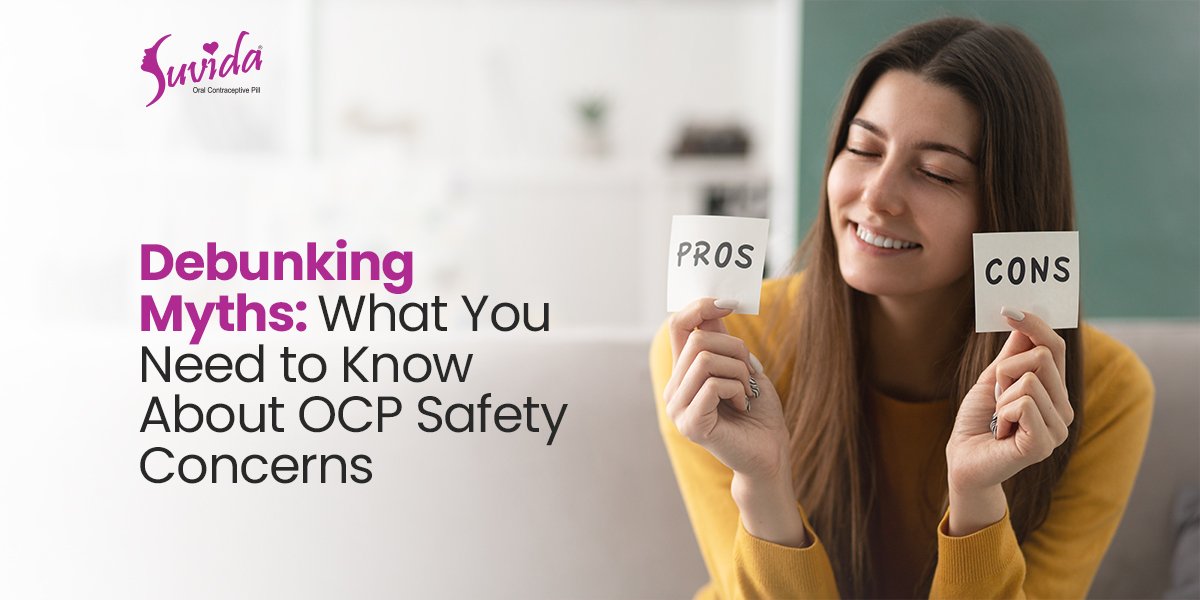Debunking Myths: What You Need to Know About OCP Safety Concerns
Birth control pills have dominated the market of contraceptives since their launch in the 1960’s. Despite their long-standing presence in reproductive health, many women still harbour oral contraceptive myths. An unusual myriad of multiple contraceptive myths often cloud the conversation about the use and safety of OCPs.
This blog sheds light on common safety concerns, debunking common myths about birth control pills, clarifies safety concerns of the OTC contraceptive pill and explores the benefits of OCPs beyond birth control.

Common Myths About Contraception
The common myths and facts about contraception stem from outdated information or misunderstandings about OCPs.
Here we explore some popular oral contraceptive myths and the facts behind OCPs to provide accurate knowledge.
1. Myth: Birth Control Pills Are Unsafe for Long-Term Use
Reality: Many women believe OCPs are dangerous when used over an extended period. However, long-term OCP use has been associated with reduced risks of ovarian and endometrial cancers.
2. Myth: OCPs Lead to Infertility
Reality: The fact is normal fertility typically resumes after stopping the birth control pills. While it may take time for ovulation to regulate, OCPs have no lasting impact on a woman’s fertility.
3. Myth: You Need to Take a Break from OCPs Occasionally
Reality: There is no medical reason to take a break from OCP use. In fact, “pill breaks” can disrupt hormone regulation and lead to unintended pregnancy. Continuous use is both safe and effective for women without underlying health concerns.
4. Myth: OCPs are used only to prevent unwanted pregnancy
Reality: OCPs are prescribed for numerous reasons. There are many medical benefits of them other than contraception. Some of these include, regulation of menstrual cycle, reduction of menstrual cramps, decrease the acne, control of PCOS symptoms and reduce the chances of ovarian cancer.
5. Myth: Only Married or Sexually Active Women Should Use OCPs
Reality: OCP is beneficial for various medical reasons beyond contraception, such as managing hormonal imbalances, reducing menstrual cramps, and treating acne. Many young women use them for health reasons unrelated to sexual activity.
6. Myth: OCPs cause side effects such as acne and weight gain
Reality: Since OCPs manage the symptoms related to PCOS, the acne improves. Also, many women are worried about putting on weight with OCPs. However, the studies show that there is no association between taking OCPs and weight gain.
7. Myth: OCPs should only be used after a certain age
Reality: OCPs can be safely used in women of any age once they attain puberty. By the time adolescents have their first period, it is safe to be used.
8. Myth: OCPs should not be used if you get migraines
Reality: Migraines often occur with periods and these migraines may be improved by the continuous use of OCPs. The only migraines that require careful consideration are those where there is a loss of nerve function or numbness in an arm or leg.
If these types of migraines occur, other options may need to be considered, such as progesterone-only contraception.
Understanding the Real Risks
- While many myths circulate about oral contraceptives, it is crucial to understand the real OCP safety concerns associated with them.
- Like all medications, oral contraceptives can have side effects but serious ones are rare.
- Some common side effects include nausea, headaches, and mood changes, but these often subside after a few months of use.
- For most women, the benefits far outweigh these minor risks.
- For some, hormonal birth control can also cause a range of physical and emotional symptoms, from joint pain to psychosis.
- Moreover, certain health conditions may increase the risk of complications when using OCPs, such as smoking or having a history of blood clots.
- Therefore, discussing personal health history with a healthcare provider is essential before starting any contraceptive method.
The Benefits of OCPs Beyond Birth Control
Oral contraceptive pills offer several benefits beyond preventing pregnancy. These advantages highlight the versatility of OCPs in addressing women’s health needs:
- Regulation of menstrual cycle
- Decrease in menstrual cramps
- Management of endometriosis symptoms
- Reduced risk of ovarian and endometrial cancers
- Reduction in acne outbreaks
- Decrease in heavy menstrual bleeding
- Improvement in symptoms of premenstrual syndrome (PMS)
- Assists in managing symptoms associated with PCOS.
Related Blog: Top 10 Benefits of Birth Control Pills
How to Use OCPs Safely
Before starting, it is important to discuss the key factors with a healthcare provider regarding the OCP safety concerns:
- Understand Personal Health History: Review any personal or family history of blood clots, cardiovascular disease, or other risk factors.
- Check for Medication Interactions: Discuss any medications or supplements you are taking that might interact with OCPs.
- Be Clear on Usage Instructions: Consistently taking OCPs at the same time each day maximizes effectiveness.
- Know Alarming Symptoms: Be aware of alarming symptoms like severe leg pain, chest pain, or shortness of breath, which require immediate medical attention.
- Regular Check-Ups: Schedule regular check-ups to monitor your health while on OCPs.
Making Informed Choices about OCPs
Understanding the realities surrounding oral contraceptive pills is vital for making informed decisions about reproductive health. By debunking birth control myths and recognising the true benefits and risks associated with OCPs, individuals can approach their contraceptive choices with confidence and clarity.
By understanding the above facts women can make confident, informed choices about their reproductive health.
Empowerment begins with knowledge, and OCPs, when used wisely, can be a safe, effective tool for both birth control and broader health benefits.
